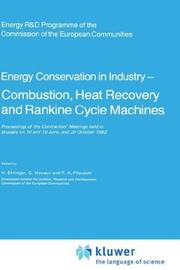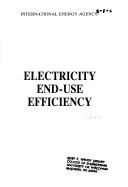| Listing 1 - 9 of 9 |
Sort by
|

ISBN: 9172229977 9789172229976 Year: 1985 Volume: 15 Publisher: Göteborg: University of Göteborg,
Abstract | Keywords | Export | Availability | Bookmark
 Loading...
Loading...Choose an application
- Reference Manager
- EndNote
- RefWorks (Direct export to RefWorks)
Manufacturing industries --- Cement industries --- Energy consumption --- Econometric models --- -Cement industries --- -Manufacturing industries --- -Industries --- Manufactures --- Nonmetallic minerals industry --- -Energy consumption --- -Econometric models --- Econometric models. --- Industries --- Energy consumption&delete& --- Manufacturing industries - Energy consumption - Mexico --- Manufacturing industries - Energy consumption - Mexico - Econometric models --- Cement industries - Energy consumption - Mexico --- Cement industries - Energy consumption - Mexico - Econometric models
Book
ISBN: 9781603585385 9781603583718 1603583718 1603583726 1603585389 Year: 2011 Publisher: White River Junction (Vermont) Chelsea Green Publishing
Abstract | Keywords | Export | Availability | Bookmark
 Loading...
Loading...Choose an application
- Reference Manager
- EndNote
- RefWorks (Direct export to RefWorks)
Oil and coal have built our civilization, created our wealth, and enriched the lives of billions. Yet, their rising costs to our security, economy, health, and environment now outweigh their benefits. Moreover, that long-awaited energy tipping point?where alternatives work better than oil and coal and compete purely on cost?is no longer decades in the future. It is here and now. And it is the fulcrum of economic transformation.A global clean-energy race has emerged with astounding speed. The ability to operate without fossil fuels will define winners and losers in business?and among nations.In Reinventing Fire, Amory Lovins and Rocky Mountain Institute offer a new vision to revitalize business models, end-run Washington gridlock, and win the clean-energy race?not forced by public policy but led by business for enduring profit. This groundbreaking roadmap reveals market-based solutions across the transportation, building, industry, and electricity sectors. It highlights pathways and competitive strategies for a 158%-bigger 2050 U.S. economy that needs no oil, no coal, no nuclear energy, one-third less natural gas, and no new inventions.This transition would cost $5 trillion less than business-as-usual?without counting fossil fuels? huge hidden costs. It requires no new federal taxes, subsidies, mandates, or laws. The policy innovations needed to unlock and speed it need no Act of Congress.Whether you care most about profits and jobs, national security, health, or environmental stewardship, Reinventing Fire charts a pragmatic course that makes sense and makes money. With clarity and mastery, Lovins and RMI point out the astounding opportunities for enterprise to create the new energy era.Drawing praise President Bill Clinton, former National Security Advisor Robert McFarlane, and a host of others, Reinventing Fire has piqued the interest of world leaders, business leaders, and political strategists.The paperback will carry a new preface detailing the response from China and beyond.Bron : http://www.amazon.com
Energy development --- Renewable energy sources --- Energy consumption --- Energy policy --- Industries --- Energy conservation --- Energie --- Energiesector --- Duurzame energie --- Alternatieve energie --- Managementmodellen --- Verenigde Staten --- Energiebeleid --- Managementmodel --- Belasting (fiscaal) --- Energy development - United States --- Renewable energy sources - United States --- Energy consumption - United States --- Energy policy - United States --- Industries - Energy consumption - United States --- Industries - Energy conservation - United States

ISBN: 9027715807 9789027715807 Year: 1983 Volume: 8436 Publisher: Dordrecht: Reidel,
Abstract | Keywords | Export | Availability | Bookmark
 Loading...
Loading...Choose an application
- Reference Manager
- EndNote
- RefWorks (Direct export to RefWorks)
Industries --- Industrie --- Energy conservation --- Congresses --- Economies d'énergie --- Congrès --- Congresses. --- 620.9 <063> --- -Industrial production --- Industry --- Economics --- Economics of energy in general--Congressen --- -Congresses --- -Economics of energy in general--Congressen --- 620.9 <063> Economics of energy in general--Congressen --- Industrial production --- Energy conservation&delete& --- Report --- E-books --- Ceramics. --- Chemical industry. --- Food. --- Industries. --- Metallurgy. --- Power resources. --- Industries, Primitive --- Industries - Energy conservation - Congresses --- Catalysis --- Microwave --- Textiles
Book
ISBN: 9282619001 9789282619001 Year: 1990 Volume: 13142 Publisher: Luxembourg: Office for official publications of the European Communities,
Abstract | Keywords | Export | Availability | Bookmark
 Loading...
Loading...Choose an application
- Reference Manager
- EndNote
- RefWorks (Direct export to RefWorks)
620.9 --- 66/67:63 --- (4-67EU) --- $?$91/06 --- Agricultural processing industries --- Food industry and trade --- Energy conservation --- Congresses --- Technological innovations --- Agricultural processing industries - Energy conservation - Congresses --- Food industry and trade - Energy conservation - Congresses --- Agricultural processing industries - Technological innovations - Congresses --- Food industry and trade - Technological innovations - Congresses
Book
ISBN: 9781138311756 1138311758 0429858388 0429458657 042985837X 9780429458651 9780429858376 9780429858369 0429858361 9780429858383 Year: 2019 Publisher: London: Routledge,
Abstract | Keywords | Export | Availability | Bookmark
 Loading...
Loading...Choose an application
- Reference Manager
- EndNote
- RefWorks (Direct export to RefWorks)
This book explains how social psychological concepts can be closely integrated with sociotechnical perspectives of energy transitions. It shows the value of actor-centred analysis that acknowledges the role of individual-level processes within their wider contexts of energy supply and use. In this way, the book connects social psychological and sociological frames of analysis, preserving the value of both, to provide multi-level, analytically extended accounts of energy transitions processes. Sociotechnical thinking is about the interactions of people and technology, including the rules, regulations and institutions involved. Such perspectives help to identify the many forms of path dependency that can make change difficult. Human behaviour plays a strong role in maintaining these path dependencies, but it can also introduce change. This book advocates a deliberately interdisciplinary research agenda that recognises the value of social psychological perspectives when seeking to create new pathways for energy supply and use. At the same time, it also demonstrates the value of sociotechnical perspectives for energy-related social psychology. Energy Transitions and Social Psychology will be of great interest to students and scholars of energy transitions, environmental and energy psychology, sustainable development and innovation studies, as well as students and scholars of environment and energy more generally.
Energy consumption --- Renewable energy sources --- Psychological aspects --- Renewable energy sources. --- Energy development --- BUSINESS & ECONOMICS / Real Estate / General --- SCIENCE / Energy --- BUSINESS & ECONOMICS / Industries / Energy Industries --- Psychological aspects. --- Environmental aspects. --- Alternate energy sources --- Alternative energy sources --- Energy sources, Renewable --- Sustainable energy sources --- Power resources --- Renewable natural resources --- Agriculture and energy --- Consumption of energy --- Energy efficiency --- Fuel consumption --- Fuel efficiency --- Energy conservation --- Energy consumption - Psychological aspects
Book
ISBN: 3184190951 9783184190958 Year: 1984 Publisher: Düsseldorf: VDI,
Abstract | Keywords | Export | Availability | Bookmark
 Loading...
Loading...Choose an application
- Reference Manager
- EndNote
- RefWorks (Direct export to RefWorks)
Industries --- Industrie --- Energy conservation --- Congresses --- Economies d'énergie --- Congrès --- Industry --- -Industries --- -620.91 --- Industrial production --- Economics --- -Congresses --- Energy resources in general. Natural sources of energy --- Conferences - Meetings --- Congresses. --- 620.91 Energy resources in general. Natural sources of energy --- Economies d'énergie --- Congrès --- 620.91 --- Energy conservation&delete& --- Économies d'énergie --- Congrès et conférences --- Industries, Primitive --- Industries - Energy conservation - Congresses --- Économies d'énergie --- Congrès et conférences

ISBN: 9027715815 9048183820 9401576742 9789027715814 Year: 1983 Volume: 8434 Publisher: Dordrecht: Reidel,
Abstract | Keywords | Export | Availability | Bookmark
 Loading...
Loading...Choose an application
- Reference Manager
- EndNote
- RefWorks (Direct export to RefWorks)
Industries --- Combustion engineering --- Heat recovery --- Energy conservation --- Congresses. --- 621.4 --- -Heat recovery --- -Industries --- -Industrial production --- Industry --- Economics --- Recovery of waste heat --- Waste heat recovery --- Cogeneration of electric power and heat --- Heat engineering --- Heat regenerators --- Waste heat --- Heat engines (except steam engines) --- Congresses --- -Congresses --- -Heat engines (except steam engines) --- 621.4 Heat engines (except steam engines) --- -621.4 Heat engines (except steam engines) --- Industrial production --- Energy conservation&delete& --- Industries, Primitive --- Industries - Energy conservation - Congresses --- Combustion engineering - Congresses --- Heat recovery - Congresses

ISBN: 9264132597 9789264132597 Year: 1989 Publisher: Paris: OECD,
Abstract | Keywords | Export | Availability | Bookmark
 Loading...
Loading...Choose an application
- Reference Manager
- EndNote
- RefWorks (Direct export to RefWorks)
Electric utilities --- Electric power --- Household appliances, Electric --- Industries --- Government policy. --- Conservation. --- Energy consumption. --- 621.316 --- -Electric power --- -Household appliances, Electric --- -Industries --- -Industrial production --- Industry --- Economics --- Domestic electric apparatus --- Electric apparatus and appliances, Domestic --- Electric household appliances --- Dwellings --- Electric apparatus and appliances --- Home economics --- Electric household appliances industry --- Electric power supply --- Power supply, Electric --- Power resources --- Electric companies --- Electric light and power industry --- Electric power industry --- Electric industries --- Energy industries --- Public utilities --- Distribution and regulation of electric energy. Switching. Commutation. Circuit-breaking. Protection --- Government policy --- Conservation --- Energy consumption --- Electric equipment --- Equipment and supplies --- -Distribution and regulation of electric energy. Switching. Commutation. Circuit-breaking. Protection --- 621.316 Distribution and regulation of electric energy. Switching. Commutation. Circuit-breaking. Protection --- -621.316 Distribution and regulation of electric energy. Switching. Commutation. Circuit-breaking. Protection --- Industrial production --- Industrial energy consumption --- Conservation of electric power --- Electric power conservation --- Electricity --- Energy conservation --- Electric utilities - Government policy. --- Electric power - Conservation. --- Household appliances, Electric - Energy consumption. --- Industries - Energy consumption.
Book
ISBN: 9781784781293 1784781290 1784781320 9781784781323 9781784781309 9781784781316 Year: 2016 Publisher: London: Verso,
Abstract | Keywords | Export | Availability | Bookmark
 Loading...
Loading...Choose an application
- Reference Manager
- EndNote
- RefWorks (Direct export to RefWorks)
How capitalism first promoted fossil fuels with the rise of steam power. The more we debate about the catastrophic implications of climate change, the more fossil fuels we continue to burn. How did we get caught up in this mess? In this masterful new history, Malm claims that it all began in Britain with the rise of steam power. So why did manufacturers turn from traditional fuels, notably water, to steam? Overturning established theories of the transition and offering a radically new view of our warming world, this study shows how steam was adopted as a superior source of power. Two centuries later, the inheritors of that power continue to profit from "business as usual", as the world heads toward irreversible catastrophe. Malm examines the history of resistance to fossil fuels and surveys the obstacles to the transition to renewable energy so urgently needed today. Then as now, energy choices are determined in struggles over power.
Industries --- Industrial revolution --- Steam-engines --- Fossil fuels --- Energy policy --- Global warming --- Climatic changes --- Industrie --- Révolution industrielle --- Machines à vapeur --- Combustibles fossiles --- Politique énergétique --- Réchauffement de la Terre --- Climat --- Energy consumption --- History --- Economic aspects --- Environmental aspects --- History. --- Consommation d'énergie --- Histoire --- Aspect économique --- Aspect de l'environnement --- Changements --- POLITICAL SCIENCE / Public Policy / Environmental Policy. --- BUSINESS & ECONOMICS / Environmental Economics. --- Industri. --- Industriella revolutionen --- Energiförbrukning. --- Ångmaskiner. --- Ångteknik. --- Fossila bränslen --- Energipolitik --- Miljöpolitik. --- Global uppvärmning. --- Klimatförändringar. --- Dampfkraftwerk. --- Klimaänderung. --- Miljöaspekter. --- Ekonomiska aspekter. --- 1800-talet. --- Storbritannien. --- Historia. --- World history --- Industries - Energy consumption - Great Britain - History - 19th century --- Industrial revolution - Environmental aspects - Great Britain --- Steam-engines - Great Britain - History - 19th century --- Fossil fuels - Economic aspects - History --- Energy policy - Environmental aspects - History --- Global warming - History --- Climatic changes - History --- Réchauffement de la Terre. --- Changements climatiques. --- Aspect environnemental --- Aspect économique. --- Aspect environnemental. --- Climatic change --- Ressource naturelle --- Transition énergétique --- Histoire économique --- Industrialisation --- 19e siècle --- Capitalisme
| Listing 1 - 9 of 9 |
Sort by
|

 Search
Search Feedback
Feedback About UniCat
About UniCat  Help
Help News
News